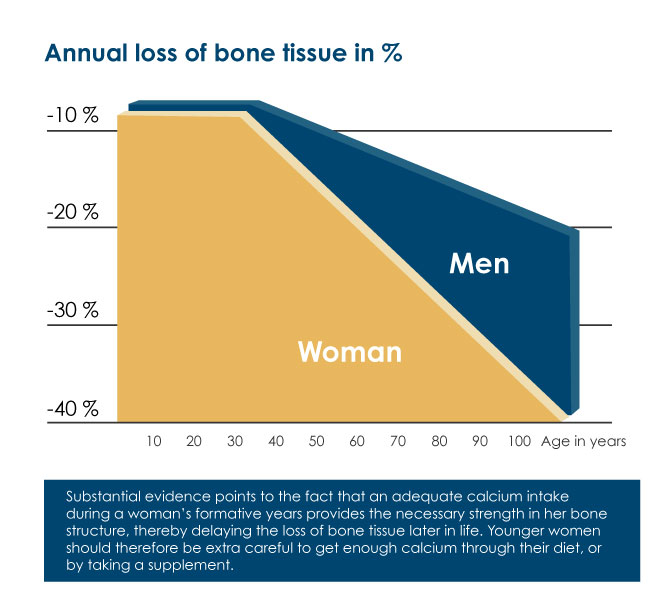| 2 tablets contain | % RDA * | ||
|---|---|---|---|
| Calcium | 800 mg | 100 % | |
| Vitamin D | 10 µg | 200 % |
* RDA= Recommended Daily Allowance.
Product Facts
Dosage
2 tablets daily, unless otherwise advised. The tablets can be chewed or swallowed whole.
Do not exceed the recommended daily dosage.
Should only after consultation with a physician or nurse practitioner be used by pregnant or children under 1 years of age.
Dietary supplements should not replace a varied diet.
A healthy lifestyle and a varied balanced diet are important for maintaining good health.
Ingredients
Calcium carbonate, sweetener: sorbitol, anti-caking agent: polyvinyl pyrrolidone, sweetener: xylitol, firming agent: magnesiumsalts of fatty acids, silicon dioxide, glazing agent: hydroxypropyl methylcellulose, peppermint powder, vitamin D3 (cholecalciferol).
Storage
Dark, dry and at room temperature.
Keep out of reach of young children.
Contain sweeteners.
What is Bio-Calcium+D3?
Bio-Calcium+D3 are tablets with the active nutrients Calcium and vitamin D who are involved in the maintenance of normal bone tissue. The calcium is ionised in the stomach, and absorbed in the intestine with help from the vitamin D3. The tablets have a fresh peppermint flavor and can be chewed or swallowed whole. Each tablet contributes with 400 mg of calcium and 5 micrograms of vitamin D.
Divide the daily dose out on two meals.
What is calcium?
Calcium is an element and also the most abundant mineral in the human body. The most prominent function of calcium is its need in the maintenance of normal teeth and bones. Bone tissue also functions as the body's calcium storage facility. If the body gets too little calcium, it breaks down calcium from bone tissue to cover its needs.
The percent of the body's calcium which is not channeled into teeth and bones supports different body functions. For instance, calcium contributes to:
- Normal maintenance of muscle function
- Normal neurotransmission
- Normal blood clotting
- Normal energy metabolism
- Normal function of digestive enzymes
Calcium and bones
The bones consist of living tissue that is constantly being replaced. The bone-forming cells are called osteoblasts and the bone-degrading cells are called osteoclasts. As bone tissue also functions as the body's calcium storage facility., it is particularly important that we absorb sufficient calcium in the bones. If the body gets too little calcium, the osteoclasts are activated which breaks down bone tissue to cover the body's need for calcium.
It is important that you get enough calcium and vitamin D during the years when your bones are developing. Children and young people increase their bone mass because the osteoblasts are more active than osteoclasts up to the point where the bones reach their peak mass (usually around the age of 30 years). It's been called “building a bone bank.” After reaching this peak mass the amount of calcium lost from the bones will exceed the amount stored, causing a net loss of bone mass (about 0.6% per year). Although it is a slow and gradual loss, you will benefit from a high "peak bone mass" as possible right from the beginning of this age-related loss of bone mass.
In addition, women suffer more from a hormone-related loss of bone mass from the beginning of their menopause. As a consequence their total annual loss of bone mass can be as much as six per cent when their ovaries stop producing hormones.
Men's loss of bone mass is generally only one-half of that of women.
An active non smoking lifestyle also helps to prevent loss of bone mass.
As shown in the following illustration, women are more exposed to loss of bone mass than men. Research shows that women who are treated with estrogen are not necessarily in less need of calcium.
Where do we get calcium?
- dairy products
- grain and seeds
- almonds nuts
- vegetables
- fruit
What is vitamin D?
Vitamin D is a fat-soluble vitamin that is available in several forms, of which D2 and D3 are the most important. D3 is the form of vitamin D that is absorbed most easily in the body. Vitamin D is in fact a pro-vitamin, as we are able to synthesize it in our skin when we get exposed to sufficient amounts of sunshine. However, at latitudes similar to Scandinavia the Sun is only high enough in the sky for us to produce vitamin D from may to september. Vitamin D is necessary for the body to metabolize calcium and for the function of bones and muscles.
Vitamin D:

- Has a role in the process of cell division and specialisation
- Contributes to the maintenance of normal bones,teeth and muscle function
- Plays a role in the absorption and utilization of calcium and phosphorus
- Contributes to normal blood calcium levels
- Supports a normal and well-functioning immune system
In recent years, science has focused on our need for vitamin D. Health authorities recommend Vitamin D supplements to children, pregnant women, dark-skinned children/adults, veiled women (and others who wear garments that cover most of the body), and to individuals who rarely or never get exposed to sunlight. In addition, nursing home residents and people over the age of 70 are advised to take vitamin D as a means of protection against brittle bones.
Calcium with vitamin D is necessary for normal bone formation in children.
Official claims
The European Food Safety Authority (EFSA) has evaluated the evidence behind calcium and vitamin D and has acknowledged the following claims:
Calcium
- Is needed for the maintenance of normal bones and teeth
- Contributes to the maintenance of normal muscle function
- Contributes to normal blood clotting
- Contributes to normal neurotransmission
- Contributes to normal energy-yielding metabolism
- Contributes to normal function of digestive enzymes
- Has a role in the process of cell division and specialisation
- Calcium and vitamin D are needed for the normal growth and development of bone in children (Art. 14)
Vitamin D
- Contributes to the maintenance of normal bones and teeth
- Contributes to normal blood calcium levels
- Contributes to normal absorption/utilisation of calcium and phosphorus
- Contributes to the maintenance of normal muscle function
- Contributes to normal function of the immune system
- Has a role in the process of cell division and specialisation
- Vitamin D is needed for the normal growth and development of bone in children (Art. 14b)
Related Products
 Bio-Magnesium: Magnesium is included together with calcium in bone and tooth tissue and also contributes to normal muscle function.
Bio-Magnesium: Magnesium is included together with calcium in bone and tooth tissue and also contributes to normal muscle function.

